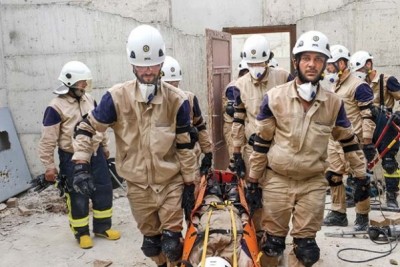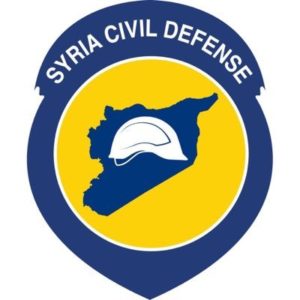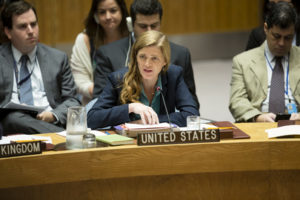The ‘White Helmets’ Controversy

The saturation of propaganda from massive investments by Western interests in NGOs like the “White Helmets” has skewed the public’s understanding of foreign crises, such as Iraq in 2003 and Syria today, writes Rick Sterling.
Across the mainstream Western media, the “White Helmets” are hailed as heroic first responders rescuing injured civilians in rebel-controlled parts of Syria. The U.K. Guardian and The Independent urged the Nobel Committee to award this year’s Nobel Peace Prize to the “White Helmets.” As it turned out, they didn’t get that one, but they did receive the prestigious 2016 “Right Livelihood Award.”
On the U.S. side of the Atlantic, the “White Helmets” are treated with similar uncritical acclaim. They were the subject of the Oct. 17 TIME magazine cover story. Netflix has released a special “documentary” movie about them. New York Times columnist Nicholas Kristof has gushed over them for years, helping the group’s one-sided depiction of events inside Syria shape the pro-rebel narrative that is pretty much all the American and European publics hear about Syria.
The “White Helmets” symbol, expropriating the name of “Syria Civil Defense.”
And, this love-fest is not just confined to establishment media. DemocracyNow! ran a puff piece interview with the White Helmet infomercial directors. The Intercept published an uncritical promotion of the “White Helmets” and the group’s controversial leader. Codepink recommended the Netflix movie (though after receiving criticism about the endorsement, the anti-war group removed it).
Yet, despite the favorable “group think” regarding the “White Helmets” – and more broadly about the rebel cause in Syria – there is another side to the story, including the fact that the “White Helmets” are not just some well-meaning Syrians who emerged to help all civilians suffering from the five years of war.
Not only do they only operate in rebel-controlled areas but they are a source of propaganda about the war, indeed their very existence is an element in the larger propaganda campaign to rally international support for a “regime change” war in Syria. The “White Helmets” brand was conceived and directed by a New York-based marketing company named “The Syria Campaign,” which itself was “incubated” by a larger politically oriented marketing company called Purpose.
Along with managing the online and social media promotion of the White Helmets, the Syria Campaign has parallel efforts in support of “regime change” in Syria. One of these efforts has been to criticize United Nations and humanitarian relief organizations that supply aid to displaced persons living in areas protected by the Syrian government.
“The allegations made by the Syria Campaign and others were written by people who know nothing about the UN and how it must work,” according to an NGO worker operating in Damascus.
Exaggerated Claims
Claims that the “White Helmets” have saved 65,000 people also appear to be wildly exaggerated. The areas, served by the White Helmets and controlled by Al Qaeda’s Nusra Front and its rebel allies, have few civilians living in them. A medical doctor visiting east Aleppo two years ago described it as a “ghost town,” yet Western media reports cite a highly inflated estimated population of 250,000.
Samantha Power, Permanent Representative of the United States to the UN, addresses the Security Council meeting on Syria, Sept. 25, 2016 (UN Photo)
Perhaps unintentionally, the “White Helmets” and one of their video teams confirmed this reality in producing a “cat video” when cat videos were all the rage on social media. In an apparent bid to bring cat lovers onto the side of “regime change” in Syria, the White Helmets’ video showed White Helmet members playing with stray cats in empty neighborhoods, saying: “The homeowners abandoned this district and its kittens.”
Besides promoting themselves as a humanitarian group, the White Helmets have become essential to the propaganda war by gaining — along with similar pro-rebel “activists” — a virtual monopoly on information from rebel-controlled areas, supplying a steady stream of heart-rending stories and images about suffering children to a credulous Western media wanting to believe everything bad about the Syrian government.
One of the reasons why the “White Helmets” have been so successful in inserting their propaganda into Western media is that most of the rebel zones of Syria, especially east Aleppo, have been off limits to Western journalists and other outside observers for years. Two of the last Western reporters to venture into rebel territory, James Foley and Stephen Sotloff, were subsequently beheaded by the Islamic State.
So, as the Syrian government and its allies finally try to expel Al Qaeda terrorists and their cohorts from east Aleppo, the White Helmets have become a major source for the Western news media which treats these “relief workers” as credible providers of on-the-ground information.
Thus, the positive image of the White Helmets and the group’s skillful use of social media deflect attention from the sectarian, violent and unpopular nature of Al Qaeda’s Nusra Front (recently renamed the Syria Conquest Front) and other armed opposition groups while hyping accusations that Syrian and Russian attacks are primarily hitting civilians.
In other words, the White Helmets have gone from being talked about to being the ones doing the talking. News stories increasingly use White Helmet witnesses as their sources, often in ways that promote the self-serving myth of White Helmet heroism. One day, CNN announced that a White Helmet aid center had been hit. Another day, TIME magazine claimed that White Helmet workers were being “hunted”.
‘Eyewitness’ Accounts
Reports from the White Helmets also have served as “eyewitness” accounts about the Syrian military using “barrel bombs,” including in an attack to destroy a Syrian Arab Red Crescent humanitarian convoy and warehouse on Sept. 19 in Orem al Kubra. But there were reasons to be suspicious of this claim since this town is controlled by the infamous Nour al Din al Zinki terrorist group, which recently filmed itself beheading a Palestinian Syrian boy.
U.S.-backed Syrian “moderate” rebels smile as they prepare to behead a 12-year-old boy (left), whose severed head is held aloft triumphantly in a later part of the video. [Screenshot from the YouTube video]
It was also illogical that Syrian or Russian planes would attack a SARC convoy, which they could have stopped when it was in government held territory. Plus, the Syrian government works with SARC. And, the ones to “benefit” from the attack were the rebels and their Western backers who cited this atrocity as another reason for “regime change” and to condemn the Russians for assisting the Syrian government. The attack also took attention away from the U.S. airstrike that killed some 70 Syrian soldiers on Sept. 17.
After the convoy was struck, the Russian and Syrian governments called for an independent investigation of the attack site but this has not been done, presumably because the terrorists controlling the area have not allowed it. Nevertheless, the narrative supplied by the White Helmets and other pro-rebel factions – blaming the Syrian government and their Russian allies – has dominated the Western media’s handling of the story.
The “White Helmets” also played a dubious role in allegations that the Syrian government was using chlorine gas in 2013 and 2014 by warning residents before the attacks to expect the Syrian military to drop chlorine bombs, although it was unclear how the activist first-responders would know that fact in advance. In one of the cases, seven witnesses told U.N. investigators that the rebels had staged the chlorine-gas attack, which could suggest that the “White Helmets” were in on the scam.
So, are the White Helmets heroes or a politically motivated hoax? The time to investigate is now, since it does little good to uncover the lies and manipulations years later, as has happened with the Iraqi and Libyan “regime change” invasions.
A Dangerous Replay
Evidence now suggests that we are seeing a replay of Curveball and the Iraqi WMD in 2003 and the bogus hysteria about stopping a Libyan “genocide” in 2011, both debunked by later investigations but too late to spare those countries from massive death and destruction.
A scene from the “Collateral Murder” video in which an Iraqi man stops his van to aid those wounded in a lethal U.S. helicopter attack in Baghdad on July 12, 2007, only to be gunned down by the American gunners.
The belated recognition by some Americans that they are being “had” again in Syria has led to some pushback against the mainstream media’s promotion of the “White Helmets” and other pro-rebel activists. In April 2015, Dissidentvoice published an expose of the group’s creation and purpose. Since then there have been other articles and videos revealing the reality behind the “feel good” veneer.
Vanessa Beeley has produced a number of articles about the fraudulent pretense that the “White Helmets” are Syrian Civil Defense, including documentation about the real Syrian Civil Defense, which was founded six decades ago. She initiated an online Change.org petition to NOT give the Nobel Peace Prize to the “White Helmets,” an initiative that must have upset some influential people because Change.org removed the petition without explanation. (You can read the text of the petition here.)
The real Syrian Civil Defense works on a shoestring budget with real volunteers without video teams accompanying and promoting them. Most in the West are unaware the real Syrian Civil Defense even exist. The situation is similar for the Syrian Arab Red Crescent, which is a genuinely neutral and independent relief organization and has a good website.
Another online petition, also at CHANGE.ORG, which is still up and running, calls on the Right Livelihood Foundation to rescind its award to the “White Helmets.” The petition includes a number of reasons why the group does not deserve the prize and are not what they are presented to be: they stole the name Syria Civil Defense from the real Syrian organization; they appropriated the name “White Helmets” from the Argentinian rescue organization Cascos Blancos/White Helmets; they are not independent; they are funded by governments; they are not apolitical; they actively campaign for a “no-fly zone” (which even Hillary Clinton has acknowledged would “kill a lot of Syrians” although she continues to promote the idea); they do not work across Syria; they only work in areas controlled by the armed opposition, mostly under the command of Al Qaeda’s affiliate Nusra Front; they are not unarmed; they sometimes do carry weapons and they also celebrate terrorist victories; they assist in terrorist executions.
Max Blumenthal wrote a two-part exposé at Alternet: “How the White Helmets became International Heroes while Pushing US Intervention and Regime Change in Syria” and “Inside the Shadowy PR Firm that’s Lobbying for Regime Change in Syria.”
Former weapons inspector Scott Ritter, who was one of the few voices daring to contest President George W. Bush’s false claims about Iraq’s WMD, wrote an article which challenged the White Helmets’ “lionization.”
Internationally, the Israeli TV station I24 ran a special report with the title “White Helmets: Heroes or Hoax?” – giving equal coverage to supporters and critics. Even “The National” out of United Arab Emirates has documented the controversy around the White Helmets.
Not surprisingly, this dissent to the mainstream media’s love affair with the White Helmets drew return fire. The British military contractor who initially set up the group accused critics of being “proxies” for the Syrian and Russian governments (much as Ritter and other skeptics about the Iraqi WMD “group think” were called “Saddam apologists” in 2003).
The controversy also has done little to chasten the Western press corps from relying on the “White Helmets” as the go-to sources for information in Syria’s conflict zones.
Rick Sterling is an investigative journalist and member of Syria Solidarity Movement.




![U.S.-backed Syrian "moderate" rebels smile as they prepare to behead a 12-year-old boy (left), whose severed head is held aloft triumphantly in a later part of the video. [Screenshot from the YouTube video]](https://consortiumnews.com/wp-content/uploads/2016/07/Screen-Shot-2016-07-21-at-12.32.20-PM-300x241.png)
